As Andrew Ng once said, “Artificial intelligence is the new electricity.”
It’s a simple line, but it captures something big. Just like electricity transformed every industry it touched, quietly powering homes, factories, and cities, AI agents are now beginning to power the invisible intelligence behind modern digital experiences.
In dating apps, this shift is especially noticeable. You're not just using static algorithms or swiping through endless profiles anymore.
Instead, AI agents in dating apps are observing your behaviour, learning from your interactions, and adapting your experience in real time.
They help suggest better matches, detect emotional tone in conversations, improve response timing, and even step in for safety, all without needing you to do anything extra. It’s subtle but powerful.
And just like electricity, the best AI agents don’t call attention to themselves. They work quietly in the background, making the system smarter, faster, and more human with every tap.
The future of dating won’t just be more digital. It’ll be more intelligent, thanks to agents who understand not just what you do, but why.
Let’s get to know them more:
What Exactly Is an AI Agent?
AI agents are basically self-directed software programs that can observe, learn, and act based on data, goals, and context, without needing constant user input.
They’re the result of systems built by an AI agent development company, designed to learn like a human but adapt faster and work at scale.
In dating apps, this means more than just smart recommendations.
You're dealing with something that understands your patterns, adapts to your preferences, and even makes decisions to guide your experience in real time.
Think of it like this:
Instead of giving the app all the control (and hoping the algorithm sorts it out), your AI agent becomes your sidekick.
It watches what you like, when you engage, and what kind of conversations work for you, and uses that insight to help guide your matches and interactions.
It’s not magic — it’s machine intelligence at work.
Here’s what powers it:
-
Machine learning- To recognize which profiles you're likely to be attracted to
-
Natural language processing (NLP) - To understand what type of conversations you enjoy
-
Reinforcement learning - So the agent keeps improving as you use the app more
These aren’t passive tools. They’re part of an active system that adapts its decisions the same way a human assistant might, but faster, and at scale.
That’s why AI agents in dating apps aren’t just a cool add-on; they’re a completely new way to interact with dating platforms.
So if you're looking to create a dating app that stands out in 2025, this is the tech you need to get serious about.
They offer predictive matching, emotional context, and even real-time suggestions based on your in-app behaviour.
It’s like having a digital matchmaker who gets you and doesn’t sleep.
Beyond Chatbots: The Real Difference Between Chatbots vs AI Agents
Let’s clear something up right away: AI agents are not just chatbots with a fancier title.
Sure, both involve artificial intelligence. Both show up inside apps. And both can have conversations.
But that’s where the similarity ends.
AI chatbots in dating apps are typically reactive. Ask it a question, and it replies based on pre-programmed responses. Sometimes, it works. Most times, it feels robotic, especially in a dating context.
An AI agent, on the other hand, is proactive.
It learns. It adapts. And it doesn’t just sit there waiting for input, it makes decisions, sets priorities, and can even change its behaviour based on what it observes.
This matters a lot in dating apps, where behaviour and emotions shift constantly.
|
Aspect |
Chatbots |
AI Agents |
|
Definition |
Scripted tools that simulate conversation using rule-based logic |
Autonomous systems that perceive, learn, and act to achieve defined goals |
|
Decision-Making Process |
Follows fixed decision trees or pre-defined user flows |
Makes real-time decisions based on context, historical data, and user goals |
|
User Experience |
Often feels mechanical, repetitive, or limited in scope |
Feels personalized, adaptive, and emotionally aware |
|
Learning Ability |
No learning — responses remain the same unless manually reprogrammed |
Uses machine learning to improve match accuracy, timing, tone, and suggestions based on real user data |
|
Memory & Data Retention |
Lacks memory; treats every interaction as new |
Retains long-term behavioural patterns and emotional cues to tailor experience over time |
|
Conversation Style |
Limited to Q&A, commands, or linear flows; can break if user goes off-script |
Dynamic, fluid conversation capable of handling open-ended, context-rich interactions |
|
Personalization Depth |
Minimal — uses simple filters or pre-selected options |
Deep personalization — adjusts based on chat behaviour, likes/dislikes, sentiment, and even mood detection |
|
Initiative/Autonomy |
Reactive — responds only when prompted |
Proactive — suggests matches, opens conversations, provides feedback based on timing and prior success |
|
Emotional Intelligence |
None — cannot detect mood, sarcasm, or tone |
Uses NLP and sentiment analysis to recognize tone, adapt replies, and even pause or escalate based on mood |
|
Technology Stack |
Rule-based engines, decision trees, static input/output pairs |
NLP (Natural Language Processing), ML (Machine Learning), Reinforcement Learning, Behavioural AI, Telematics |
|
User Retention Impact |
Limited — novelty wears off quickly |
Higher interaction feels human, predictive, and rewarding |
|
Adaptability Over Time |
No — must be manually updated by developers |
Yes — evolves naturally as it gathers more data on user actions, timing, and patterns |
|
Scalability for App Growth |
Low — becomes rigid and inefficient at scale, especially for diverse user bases |
Highly scalable across user segments with personalized logic that grows with the platform |
|
Safety and Moderation Role |
Minimal — cannot assess nuanced human behaviour |
Can detect harmful patterns, toxic language, manipulation, or harassment using behavioural and emotional signals |
|
Use Case in Dating Apps |
Pre-chat welcome messages, basic user support, and FAQs |
Smart matchmaking, adaptive profile tuning, emotional conversation assist, real-time feedback, dating coaching |
|
Overall Intelligence Level |
Artificial Narrow Intelligence (ANI) — performs one simple, narrow task |
Goal-oriented AI with environmental awareness — closer to Artificial General Intelligence (AGI) in the dating context |
|
Maintenance Requirement |
Highly needs frequent manual updates to stay relevant |
Low self-learning reduces the need for frequent human intervention |
|
Real-World Experience Examples |
“Hi! Need help?” type replies in older dating apps or generic help bots |
Systems like AIMM, advanced features in Hinge/Bumble, and experimental apps using AI to guide interactions based on emotional resonance and intent |
Bottom line: Chatbots are helpful. AI agents are game-changing.
And in dating apps, where human connection is everything, these differences can shape how users engage and whether they stick around.
While AI chatbot development services still have their place for simple interactions, AI agents offer a deeper, more adaptive layer that aligns better with the future of personalized digital dating.
Role of Artificial Intelligence Agents in Dating Apps
Dating apps aren’t just evolving – they’re transforming at the core.
The role of AI agents in dating apps is no longer limited to simple matchmaking.
These systems are becoming the brain behind the app, quietly guiding your choices, improving your conversations, and adapting to your behaviour in real-time.
From chat assistance to emotional intelligence, the AI-powered dating app development is shaping everything about how people meet, talk, and connect online.
Let’s break down how it works and where the biggest shifts are happening.
1. Personalized Matchmaking That Actually Learns You
One of the most powerful dating app features today is smart, personalized matchmaking, powered by AI agents that learn your preferences over time.
Instead of offering generic suggestions, these systems analyze your actions, preferences, and even timing, creating constantly updated matches that actually make sense.
This is the AI agents' role in dating apps that users feel the most: connections that finally seem aligned with who they are and what they’re looking for.
2. Real-Time Conversation Support
Here’s where the real magic kicks in.
AI-powered assistants monitor tone, context, and rhythm, helping you say the right thing at the right time.
Whether you’re stuck on the first message or keeping a long chat alive, these agents smooth out awkward moments and boost engagement.
This is a clear example of the artificial intelligence role in dating apps, where apps go beyond basic dating app algorithms, improving human interaction, not replacing it.
3. Adaptive Profile Optimization
What works on one user's dating profile today might fall flat tomorrow.
That’s why the role of AI agents in dating apps includes tracking which parts of your profile drive results and which need a refresh. These agents offer subtle suggestions to improve your photos, bio, or tone based on real user behaviour.
That’s not automation, that’s optimization with purpose.
4. Emotional Context Recognition
This is where things go from smart to intuitive.
AI agents now assess emotional context using tone, timing, and language. If a conversation is heating up or going cold, the system knows and adapts accordingly.
This deep understanding is central to the role of artificial intelligence in dating apps, making conversations feel more thoughtful and less mechanical.
5. Predictive Compatibility Scoring
Why guess who you'll click with?
By studying your behavioral patterns, AI can predict which connections are most likely to succeed. These predictive scores go beyond swipes — they focus on actual chemistry signals.
It’s another way AI agents are revolutionizing dating apps — by removing guesswork and pushing matches that genuinely align with your vibe.
6. Real-Time Moderation & Safety
The AI agents' role in dating apps also extends to keeping users safe.
From detecting inappropriate language to flagging fake profiles, these systems are active in the background, protecting the experience without needing a “report” button.
It’s real-time moderation driven by the most advanced form of digital intuition.
7. Timing & Nudging Intelligence
AI even knows when you’re most likely to get a reply — and prompts you to act.
That’s not luck. That’s the role of AI agents in dating apps at work behind the scenes, analyzing engagement rhythms and giving gentle nudges that make things feel more natural and responsive.
It’s all about timing, and AI’s got that covered.
8. Post-Match Feedback & Continuous Learning
Every match — good or bad — becomes part of the AI’s knowledge base. One big reason dating apps fail is that they treat every user the same.
When things go well, the system remembers. When they don’t, it learns what to avoid next time.
This feedback loop is a major piece of how AI agents are revolutionizing dating apps by making them smarter every single day.
The more users interact, the better the experience gets — for everyone.
Now that you’ve seen what AI agents do behind the scenes, let’s look at the real-world use cases, how these intelligent systems are actually transforming the dating experience from swipe to spark.
How AI Agents Change the Dating Game: Use Cases
We’re not talking about basic algorithms anymore. If you are considering starting an online dating business, then you have to up your game.
AI agents in dating apps are intelligent, learning systems that actively shape how people connect, matching you smarter, helping you talk better, and protecting you while doing it.
Here’s how they’re turning bold dating app ideas into reality, creating more dynamic, personalized, and emotionally aware platforms.
1] Personalized Matchmaking That Gets Smarter With Time
Unlike old-school filters, AI matchmaking agents don’t just match based on age or interests — they evolve.
These agents track who you swipe, who you talk to, and which chats go somewhere. They use that data to get better with every interaction.
The beauty of an adaptive AI agent in dating is that it never stops learning — your matches aren’t just filtered, they’re intelligently selected based on long-term behaviour and engagement.
What It Improves:
-
Match accuracy through continuous learning.
-
Preference understanding beyond profile filters
-
User satisfaction with evolving match quality
2] In-App Dating Coaches That Guide Your Moves
A smart AI agent dating coach doesn’t wait for you to make a mistake — it helps you avoid one.
These agents observe your communication style, pickup timing, and success patterns. Then they guide you: when to follow up, how to rephrase an opener, or when to let it go.
This kind of supportive AI agent for dating adds real value without being annoying, making you a better digital communicator with every conversation.
What It Improves:
-
First message success rates
-
Chat timing and reply pacing
-
Confidence while navigating new interactions
3] Real-Time Conversation Assistants That Keep Things Flowing
We’ve all had chats die without warning.
A real-time AI conversation agent watches how the talk unfolds, picking up on energy dips, short replies, or long pauses.
Then it suggests things to say, questions to ask, or new angles to keep things alive.
These interactive AI agents in dating apps act like subtle conversational copilots, boosting engagement without making it weird.
What It Improves:
-
Natural flow in conversations
-
Reduced ghosting or awkward silences
-
Engagement in longer, more meaningful chats
4] Adaptive Profiles That Evolve With You
An AI agent for profile optimization does what most use: it won’t, it updates your profile as you evolve.
It tests different photos, bios, and prompts based on what generates the most meaningful matches.
Think of it as a self-optimizing AI agent that quietly tweaks your public face to better reflect what works based on outcomes, not guesses.
What It Improves:
-
Profile performance and visibility
-
Match conversion from profile views.
-
Alignment between profile and intent
5] Safety Agents That Moderate In Real Time
Trust is everything in dating apps.
A real-time AI moderation agent monitors chats for toxicity, manipulation, or fake profile bebehaviournd it doesn’t wait for users to report it.
AI agents now play a critical role in app security, flagging toxic behaviour, fake profiles, and manipulative chat patterns in real time, long before a human moderator can intervene.
What It Improves:
-
Immediate response to harmful behaviour
-
Trust in the dating environment
-
User retention through improved safety
6] Emotion-Aware Messaging That Reacts to Mood
What if your dating app knew when you were frustrated, nervous, or excited?
Emotionally intelligent AI agents are getting there. By analyzing tone, pacing, and rhythm, they can sense how a chat is going and suggest subtle tone shifts.
These mood-aware AI agents in dating enhance emotional connection, reduce miscommunication, and help steer conversations in a more human direction.
What It Improves:
-
Emotional flow in chats
-
Tone-matching between users
-
Conversation depth and connection
7] Smart Timing & Message Nudging
There’s a right time to say something, and timing-aware AI agents know it. These agents analyze your app usage patterns and the other person’s engagement habits.
Then, they nudge you: “Send it now,” or “Hold off for an hour.” With predictive timing AI agents, you’re not guessing anymore, you’re acting when the moment’s right.
What It Improves:
-
Open rates and response likelihood
-
Reduced cold messages
-
Engagement is aligned with peak user activity.
8] Match Feedback Loops That Refine Future Results
Every good (or bad) match teaches the system something.
Feedback-driven AI agents in dating apps track post-match outcomes, how long the chat lasted, whether you are unmatched quickly, or if you shared contact info. Then they adjust helping apps to stand out and make money.
This continuous learning AI agent model helps apps refine your future matches without you lifting a finger.
What It Improves:
-
Future match quality
-
Personalized refinement through behaviour
-
Less trial-and-error in dating
9] Intent Recognition Agents That Align User Goals
One’s looking for love, the other for something casual, that’s where it breaks.
Intent-recognizing Artificial Intelligence agents in dating apps scan your interaction patterns and profile behaviour detect what you're really seeking.
These goal-alignment AI agents ensure that your matches are actually on the same page before you even talk.
What It Improves:
-
Match alignment based on intent
-
Reduced wasted effort
-
Faster connections with like-minded users
10] Voice & Video Interaction Insight Agents
Beyond the text bubble, AI agents now assess video and voice.
AI agents for video interaction insights detect emotional tone, speech patterns, and engagement level in calls.
They translate those insights into future recommendations — which types of users you connect best with, or when energy drops.
These multi-modal AI agents in dating make deeper compatibility possible.
What It Improves:
-
Understanding chemistry beyond chat
-
Real-time call feedback
-
Enhanced matchmaking based on interaction depth
Now that you’ve seen what AI agents can do, let’s look under the hood — and break down the tech that powers all this intelligence in your dating app.
Key Technology Behind AI Agents in Dating Apps
So, what actually makes an AI agent in a matchmaking app... well, intelligent?
It’s not magic — it’s a smart mix of modern AI technologies working together behind the scenes.
These systems are built using a carefully chosen dating app tech stack, combining machine learning models, natural language processing, and real-time behaviour engines to power every match, nudge, and message.
Let’s unpack the key components that bring these AI agents to life — and make them feel more like a human companion than just code.
► Natural Language Processing (NLP)
This is what allows AI conversation agents in dating apps to understand how users talk,ot just what they say.
NLP helps agents interpret tone, detect sarcasm, and generate messages that feel natural.
Be it suggesting a better opener or nudging a conversation forward, NLP ensures the experience sounds human.
Powers:
-
Emotional tone detection
-
Smart chat suggestions
-
Mood-aware conversation flow
► Machine Learning (ML)
Machine Learning is the foundation of every learning-based AI matchmaking agent. These agents don’t just follow rules — they adapt to you.
ML allows them to analyze swipes, messages, and outcomes to continuously improve match recommendations and behavioral suggestions over time.
Powers:
-
Real-time preference learning
-
Adaptive match scoring
-
Continuous profile optimization
► Reinforcement Learning
This tech takes things a step further.
AI agents for dating behaviour modelling use reinforcement learning to test and learn from decisions over time — like suggesting matches or profile changes — and get better with feedback.
It’s what makes them proactive, not just reactive.
Powers:
-
Trial-and-error decision-making
-
Long-term strategy building
-
Self-improving matchmaking
► Intent Detection Engines
Some intent-aware AI agents in dating apps use custom logic and machine learning to figure out what users are really looking for — a serious relationship, casual dating, or friendship.
These systems analyze behavior patterns and communication style to guide smarter match filtering.
Powers:
-
Goal alignment
-
Smarter match filtering
-
Personalized user experience
► Real-Time Engagement Analytics
These tools track exactly when and how users interact, helping real-time AI engagement agents decide the best time to nudge, message, or match.
It's a crucial part of the dating app tech stack, ensuring agents don’t just act smart, they act on time.
Powers:
-
Message timing optimization
-
User habit prediction
-
Peak activity-based nudges
Together, these technologies form the intelligent backbone of modern dating platforms. Without them, AI agents in dating apps wouldn’t be adaptive, helpful, or even usable.
But with the right tech stack? They’re changing how people meet and how dating apps deliver real value.
AI Agents in Action: Real-World Dating Apps
We’re past the point of speculation: AI agents are increasingly being integrated into dating apps to improve everything from matchmaking to emotional engagement.
While most dating apps are still experimenting, a few have already made impressive strides in bringing AI agents into real use cases. These aren’t just background features — they’re reshaping how people meet, talk, and connect.
Here are some notable standouts:
1. AIMM – The AI Matchmaker That Talks Like a Human
AIMM (Artificially Intelligent Matchmaker) uses a full-fledged AI agent for personalized matchmaking, including voice-driven onboarding and post-date insights.
It mimics the experience of a professional human matchmaker, learning your tone, preferences, and even how you answer questions.
Think of it as the first real attempt to bring conversational AI into the core dating flow.
2. Replika – Building Emotional Bonds With AI
While not built as a dating app, Replika gives a strong preview of where emotionally aware AI agents could take digital dating.
Users form deep connections with their AI companion, many even reporting emotional intimacy and a relationship-like experience.s
Demonstrates how AI can simulate empathy, adapt tone, and evolve with user interaction
3. Bumble – AI for Safety and Screening
Bumble is beginning to leverage AI agent capabilities for detecting harmful behavior, flagging inappropriate content, and encouraging respectful interactions.
While the matchmaking is still algorithm-driven, its safety systems show how AI agents can assist in real-time behavioural monitoring.
If you're planning to create an app like Bumble, integrating AI agents for proactive safety and moderation isn’t optional — it’s the new standard.
The Future of AI Agents in Dating
So where’s all this going?
We’ve already seen AI agents coaching users, optimizing profiles, and managing conversations, but that’s just scratching the surface. The future of AI agents in dating is about deeper connections, context, and emotional intelligence built right into the app experience.
Imagine a dating app that evolves with you, one that learns the kind of emotional connection you gravitate toward, adapts to changes in your preferences, and supports you with insights at every stage of a potential relationship. It’s not far off.
And it raises the big question: What is the future of AI in dating apps?
Here’s where it’s headed:
-
Predictive AI matchmaking will go beyond profile data, using conversation tone, emotional signals, and behavioural trends to forecast long-term compatibility
-
Emotionally intelligent AI agents will read nuance in your interactions — detecting emotional highs, awkward silences, or growing disinterest — and offer guidance when needed.
-
Agents will start tracking relationship progression, identifying when things are building or fading, and helping users course-correct with thoughtful suggestions.
One of the most exciting directions involves Web3 dating app development, where AI agents will manage decentralized identities, verify intent through on-chain signals, and facilitate trust without traditional login systems. This could reshape how users connect securely across platforms.
As we look ahead to the next wave of future dating app trends, one thing is clear: apps won’t just help you match. They’ll help you relate: better, deeper, and with far less digital noise.
AI agents won’t be loud, intrusive, or robotic. They’ll work quietly behind the scenes, nudging conversations, surfacing the right people, and protecting your emotional bandwidth.
Love might always be complicated, but how do we navigate it? That’s about to get a lot smarter.
Thinking of Building One? Here’s What to Know
If you’re exploring the idea of launching an intelligent dating app, here’s the truth: features like swiping and chatting are just the starting line.
To stand out today — and stay relevant tomorrow, your app needs built-in intelligence. That means designing with artificial intelligence agents in dating apps at the core, not as an afterthought.
Before you dive in, get clear on what matters, from defining your agent’s role to understanding the real cost to create a dating app that actually delivers on intelligence and experience.
A] Start With the Right Data Strategy
AI agents aren’t magic — they need data to learn. You’ll need to define what behaviour is tracked (swipes, chat time, tone, etc.) and how it's processed. Without clean, actionable data, even the smartest AI agent will fall flat.
B] Go Beyond Surface-Level Matching
Modern users expect more than just “people near you.”
AI agents in matchmaking apps should analyze emotional signals, conversation dynamics, and even micro-interactions to suggest meaningful connections, not just mutual likes.
C] Prioritize Real-Time Adaptability
Unlike chatbots, AI agents work best when they can adapt in real time. That means building systems that respond to user mood, activity shifts, or even conversation drop-offs — all while feeling natural and non-intrusive.
D] Design the Agent’s Role Early
If you want to design a dating app that feels alive and responsive, define your AI agent’s role from day one, not as an afterthought.
Define your artificial intelligence agent’s role during the product design phase. Will it guide conversations? Adjust profiles? Score compatibility? Let that shape the experience from day one.
E] Build Trust Into the Agent
Trust is everything in dating. Users need to feel like their AI assistant is helping, not manipulating.
Transparency, user control, and clear feedback loops are essential if your artificial intelligence agents in dating apps are going to succeed.
F] Partner With the Right Tech Team
This isn’t just app development, it’s intelligence architecture. Look for partners who understand user psychology, AI systems, and how to blend both into a seamless product.
AI agents aren’t a trend. They’re the backbone of what dating apps are evolving into — and the better they work, the better your app will perform.
Talking about partners, we are here to tell you about the expert company that can help you.
How JPLoft Can Help You Integrate AI Agents in Dating Apps?
At JPLoft, we don’t just build apps, we build intelligent experiences.
As a forward-thinking dating app development company, we specialize in integrating AI agents that go far beyond surface-level matching.
From real-time conversation support to personalized matchmaking and emotional tone detection, we help you craft dating apps that actually connect.
Build from scratch or upgrade an existing platform, our team combines technical expertise with user-focused strategy to make sure your AI agents feel less like code and more like a connection.
Let’s create something people trust, enjoy, and keep coming back to.
Conclusion
Let’s be clear, AI agents in dating apps aren’t here to replace human emotion.
They can’t feel chemistry or understand your past. But they can help you navigate dating with more clarity, better timing, and fewer dead ends.
And that might be exactly what most people need.
So, can AI agents really improve how we date? Probably not by doing the dating for us, but by acting as quiet copilots that help us communicate, reflect, and choose with more intent.
If you're ready to create something that offers more than just swipes and matches — something truly smart, safe, and emotionally aware, it's time to build your AI agent-powered dating app with the right partner.
Let’s build dating that actually works.
FAQs
AI agents are intelligent software systems that can observe user behavior, learn from interactions, and act autonomously to guide matchmaking, conversations, and overall user experience far beyond basic filters or chatbots.
Dating apps use AI agents to suggest matches, assist with conversations, personalize profiles, detect emotional tone, and even manage safety through real-time content moderation and behavioral tracking.
Yes, by continuously learning from user behavior, chat tone, timing, and past outcomes, AI agents improve match quality through predictive compatibility scoring and real-time refinement.
Chatbots are rule-based and reactive, only responding when prompted. AI agents, on the other hand, are proactive systems that learn, adapt, and make decisions, offering a far more personalized and emotionally intelligent experience.
AI bots, or more accurately, AI agents, are on dating apps to improve how people connect. They help guide conversations, suggest compatible matches, filter out harmful behavior, and make the experience more tailored and less frustrating for users.





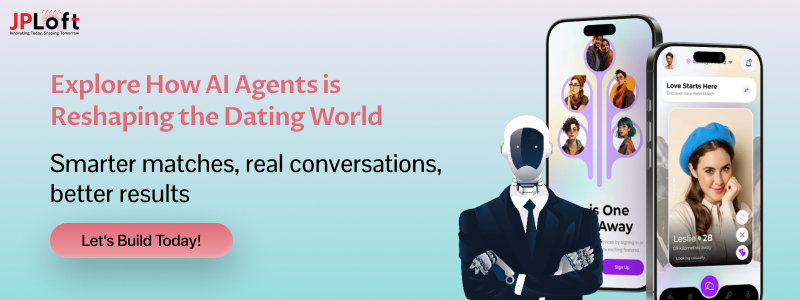
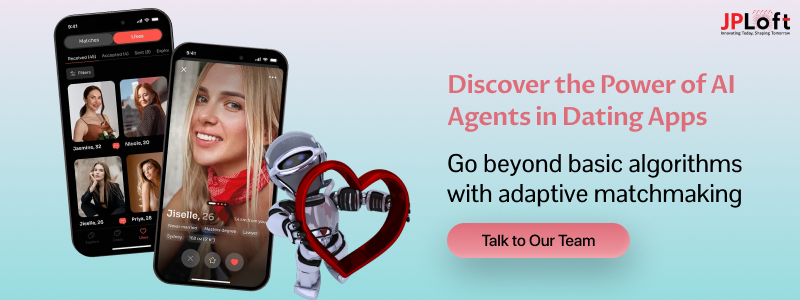

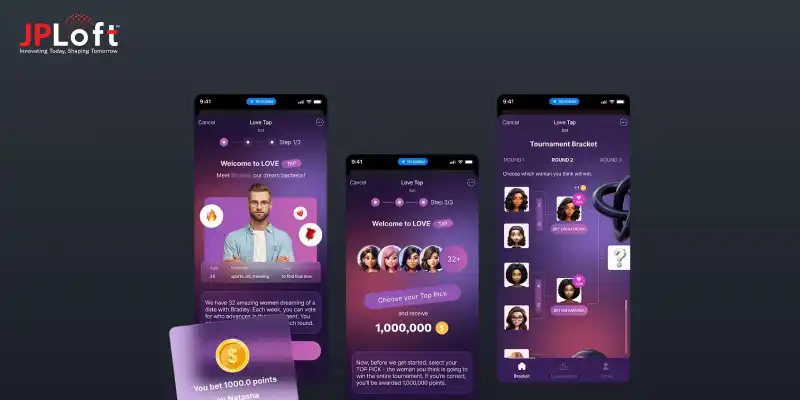
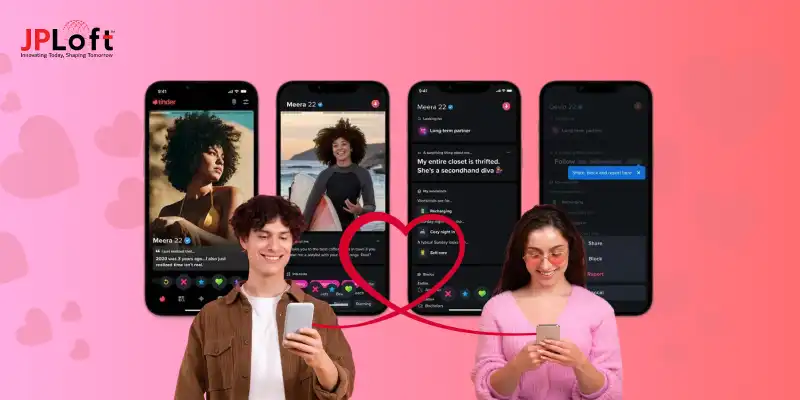
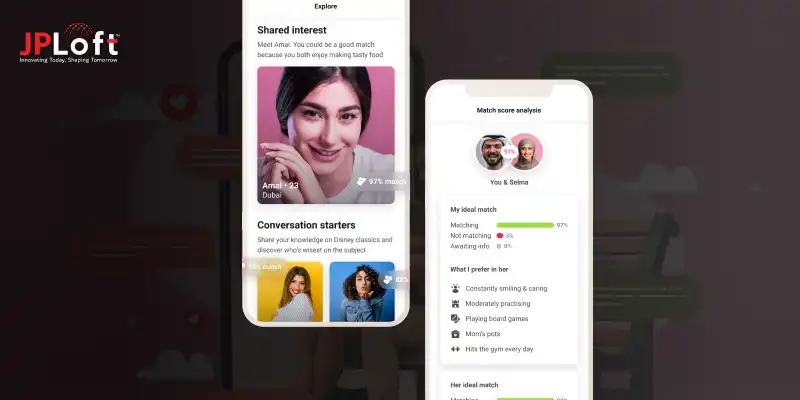


Share this blog